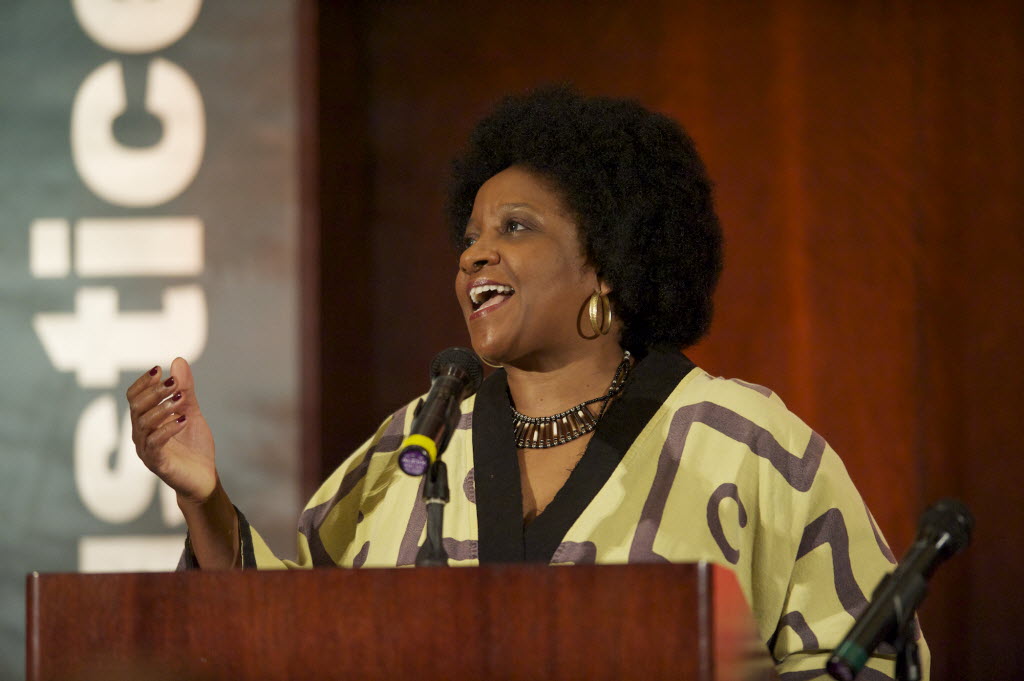A white guy rose to ask a question, and Naomi Tutu got ready to roll her eyes and brush him off.
The South African human rights activist, who was giving a presentation on racism and sexism at Vanderbilt University, thought she had his number: “An angry white man,” she said. “And indeed, he was.”
But not for the reasons she’d assumed, Tutu told the 18th annual fundraising banquet of the YWCA Clark County on Wednesday at the Hilton Vancouver Washington. The young man was angry because he’d been homeless and had spent time in Tennessee mental institutions. He agreed with Tutu’s progressive messages, he said, but she was speaking from an ivory tower where the likes of him once wouldn’t have been allowed to walk in the door. “How can you be doing that?” he wanted to know.
It was the best possible challenge, Tutu said, because it called into question her own prejudices and assumptions — the ones she’d rather deny having. The young man even approached her later on, politely, to continue the conversation, and over the following months the friendship deepened to the point where he became “Uncle Carl” to Tutu’s children — a temporary resident in her home and a permanent part of her family.
In retrospect, Tutu realized that “Uncle Carl” was one of her “painful guardian angels.”
“How close I came to closing off that opportunity,” she said — all because of her own stereotypes.
Hundreds of people turned out to support the YWCA Clark County, which aims to eliminate racism, empower women and work for peace and justice for all. Based at 3609 Main St. in Vancouver, the Y operates numerous programs, from an early childhood education classroom to a domestic violence shelter, a sexual assault crisis program to racism and social change programs for local schools.
Old and new songs
Tutu, the daughter of South African Nobel Peace Prize laureate Desmond Tutu, quoted a poem called “I Will Sing a New Song” by Howard Thurman, and likened human attitudes to songs people sing as they live their lives. Those songs sometimes grow obsolete, habitual and hurtful, Tutu said — especially when they dismiss anybody who’s different than the singer.
That’s when you need to sing a new song, Tutu said — even when that change is difficult. Sometimes, songs are sung not just by individuals but by whole communities, she said. “What is the new song that is needed here in Vancouver to make it the great community it could and should be?”
Tutu’s own mellifluous voice, rich with long, musical vowels, was a fitting vehicle for this message about songs and community. “The YWCA is a perfect example of an organization founded on singing new songs, day after day,” she said — or sang.
YWCA officials and friends reviewed the agency’s ongoing programs and achievements. In 2011, the Y’s sexual assault program answered upwards of 20,000 hotline calls with legal, medical and emotional support; provided 8,389 bed nights at the county’s only domestic violence shelter; started an anti-bullying program for young children in its classroom; provided support for more than 800 foster children who are wards of the court through its Court Appointed Special Advocates program, and helped youth and young adults who are transitioning from foster homes to independence; provided workshops and resources for women in jail; and trained 910 people through social change programs on racism and oppression at local schools and businesses.
To learn more about the Y, visit http://www.ywcaclarkcounty.com or call 360-695-0167.
Grades, grandparents
“I was always raised with the sense that I had a responsibility to the people around me,” said Tutu. But that sense of responsibility, she admitted, was sometimes taught in what she called “strange ways.” By “strange,” Tutu seemed to mean, “embarrassingly public.”
Whenever she got her report card, Tutu said, just showing it to her parents wasn’t good enough. She had to parade the card “up and down the street where my grandparents lived so every single adult could have something to say.”
Good grades earned cash rewards, she said. If she’d had lots of good grades, she said, “I would be rich now.” Bad grades, on the other hand, earned a “sitting down and talking to about the people who had sacrificed” for the sake of her education, from parents to hardworking teachers.
Responsibility, she realized, is an interactive thing, and even “a liberating thing — to know there are those who care about you and for whom you care.”
Dismissing or listening
Tutu was born in South Africa, educated in Swaziland, the United States and England, and now divides her time between South Africa and the U.S. Growing up “the daughter of” a world-famous man who has won numerous peace prizes has been a challenge all its own, according to her biography. She didn’t dwell on that during her talk.
Tutu, who already holds several graduate degrees and has taught at many colleges and universities, said she started a Master of Divinity program at Vanderbilt just three weeks ago. It’s brought home to her, once again, that change is both wonderful and challenging.
“I think I’m happy. I’m still trying to decide,” she said.
She said she’s usually the oldest person in her classes — older than the professors and definitely older than the “23-year-olds wanting to show off” how much they already know, she said. She’s tempted to roll her eyes at them — some seem like they have been put there by God just to irritate her, she said — but then she remembers to sing a different song.
“Why don’t you listen?” she asks herself. “There might be in there some wisdom, some opportunity to connect … to recognize, to grow.”




